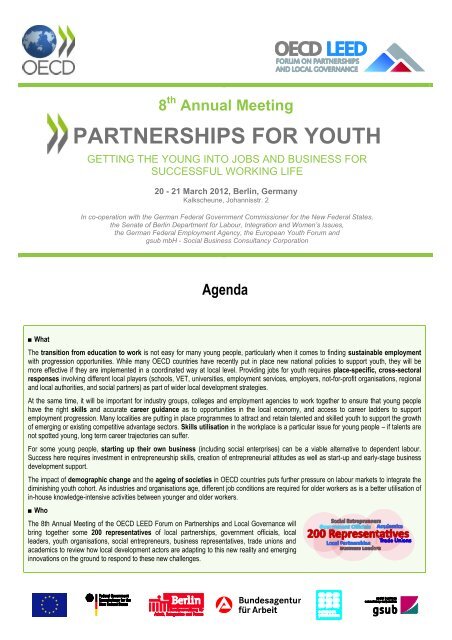Annual Meeting PARTNERSHIPS FOR YOUTH - Economic Development ...
Annual Meeting PARTNERSHIPS FOR YOUTH - Economic Development ...
Annual Meeting PARTNERSHIPS FOR YOUTH - Economic Development ...
Create successful ePaper yourself
Turn your PDF publications into a flip-book with our unique Google optimized e-Paper software.
■ What<br />
8 th <strong>Annual</strong> <strong>Meeting</strong><br />
<strong>PARTNERSHIPS</strong> <strong>FOR</strong> <strong>YOUTH</strong><br />
GETTING THE YOUNG INTO JOBS AND BUSINESS <strong>FOR</strong><br />
SUCCESSFUL WORKING LIFE<br />
20 - 21 March 2012, Berlin, Germany<br />
Kalkscheune, Johannisstr. 2<br />
In co-operation with the German Federal Government Commissioner for the New Federal States,<br />
the Senate of Berlin Department for Labour, Integration and Women’s Issues,<br />
the German Federal Employment Agency, the European Youth Forum and<br />
gsub mbH - Social Business Consultancy Corporation<br />
Agenda<br />
The transition from education to work is not easy for many young people, particularly when it comes to finding sustainable employment<br />
with progression opportunities. While many OECD countries have recently put in place new national policies to support youth, they will be<br />
more effective if they are implemented in a coordinated way at local level. Providing jobs for youth requires place-specific, cross-sectoral<br />
responses involving different local players (schools, VET, universities, employment services, employers, not-for-profit organisations, regional<br />
and local authorities, and social partners) as part of wider local development strategies.<br />
At the same time, it will be important for industry groups, colleges and employment agencies to work together to ensure that young people<br />
have the right skills and accurate career guidance as to opportunities in the local economy, and access to career ladders to support<br />
employment progression. Many localities are putting in place programmes to attract and retain talented and skilled youth to support the growth<br />
of emerging or existing competitive advantage sectors. Skills utilisation in the workplace is a particular issue for young people – if talents are<br />
not spotted young, long term career trajectories can suffer.<br />
For some young people, starting up their own business (including social enterprises) can be a viable alternative to dependent labour.<br />
Success here requires investment in entrepreneurship skills, creation of entrepreneurial attitudes as well as start-up and early-stage business<br />
development support.<br />
The impact of demographic change and the ageing of societies in OECD countries puts further pressure on labour markets to integrate the<br />
diminishing youth cohort. As industries and organisations age, different job conditions are required for older workers as is a better utilisation of<br />
in-house knowledge-intensive activities between younger and older workers.<br />
■ Who<br />
The 8th <strong>Annual</strong> <strong>Meeting</strong> of the OECD LEED Forum on Partnerships and Local Governance will<br />
bring together some 200 representatives of local partnerships, government officials, local<br />
leaders, youth organisations, social entrepreneurs, business representatives, trade unions and<br />
academics to review how local development actors are adapting to this new reality and emerging<br />
innovations on the ground to respond to these new challenges.


